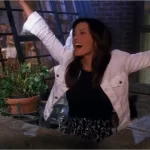Czech That Film Tour 2017: The Teacher, by Dayne Linford
Social systems have a tendency to self-replicate, and therefore self-reinforce, all the way down the ladder, forming a fractal pattern, a series of the same values and, often, the same abuses. Growing up in a capitalist system, children learn to be good little mini-businesspeople, trading candy at lunchtime and favors after school. Learning to exist according to class, the janitor’s kid soon knows to pay deference to his friend, the banker’s son. In fiction, it’s often these small-scale replications that are the most fruitful, the most intimate and powerful. Jan Hrebejk’s The Teacher is certainly one of these, the story of a small classroom in 1983 Czechoslovakia, dominated by a dictatorial teacher, who begins each school year by taking down the occupations of her student’s parents, a helpful guidebook for an extortion scheme revolving around petty favors rendered in exchange for good grades.
The conceit of the film, based on actual events, allows an almost microbial analysis of Czechoslovakian society, made particularly effective in the way it opens – Maria Drazdechová (played wonderfully by Zuzana Mauréry) stalks the aisles of her classroom, a little brown book in her hands, scribbling down the names and occupations of her student’s parents, while we cut to each of those parents, filing into the same classroom at night, attending a meeting convened secretly by other staffmembers to try and convince the parents as a group to sign a petition calling for her removal. It’s a bravura introduction, both to the characters and the stakes, but also to the world in general. Here, what counts is your occupation, the skills you bring to the collective – but what really counts is how skillfully, and secretly, you can bring the collective to your side. It’s a perfect example of theme dictating form, and it carries through to the rest of the film, as the parents begin to argue it out, some standing to tell tales of the harrowing abuse suffered by their children due to services refused, while they’re roundly criticized and hushed by others. It’s 12 Angry Men, except the lives of some 30 children hang in the balance, not one. And over it all, like the regime itself, Drazdechová dominates nearly every scene and every reaction, listening in on your conversations, recruiting spies, and playing them against each other. That’s it’s all conducted, on her end, for the smallest of stakes, makes it all the more stunning: a broken clothes-washer, a cake she’d like to smuggle to relatives in Russia. One parent is seen multiple times in the film, trying to fix a lampshade that won’t stay upright in the background, its constant collapse a perfect symbol for a system that can’t keep itself up, increasingly offering no rebuttal to the thought that perhaps it should just be thrown away.
The comparison to 12 Angry Men is particularly apt in that the near-inquisition conducted by the parents is not only an opportunity to cinematically examine Drazdechová’s corruption, but also their own complicity. Beyond the honest desire to see their children succeed, each parent has their own relationship to the state and to Communism generally: the wrestler with a penchant for physical violence who was framed by the state for defending his wife from the wrong would-be rapist; the once-physicist, now window washer, who helped his scientifically brilliant wife escape Czechoslovakia to Western Europe; the very successful doctor who happily pulls strings to provide Drazdechová with the people’s medicine; the judge who demands a list of all the parents seeking her removal. This becomes larger than a political critique, though – The Teacher is about how people organize themselves, what motivates them, and what they’re willing to stoop to, first to avoid conflict, then to circle the wagons when it comes. Politics, at that point, becomes merely a means to an end. Beyond the drama in the parents lives, there’s the way their difficulties and struggles are replicated in their children, particularly Danka Kucerová (Tamara Fischer), whose deterioration at Drazdechová’s hands, her personal prospects drying up like a river in drought, is devastating to watch.
Most fascinating, however, are the ways everyone implements the lessons in secrecy learned at the tutelage of a police state. Drazdechová plays all the angles to achieve her small victories and comforts, but she’s not the only one. Even the parents aligned against her, by all rights seeking simply to defend their children, are obliged to play the same game, meeting several times in secret to try and drum up support, but forced to reject what little help is offered by Václav Littman (Peter Bebjak), the disgraced physicist, because of how it would taint their cause, and possibly endanger his life. How these systems replicate themselves in intimate spaces is what’s most astutely portrayed in this film – that in the midst of this struggle over petty “corruption” and parental dispute, lives are actively at stake. In this way, the film delivers its strongest critique of the old regime – that things were ever allowed to get so bad, that paranoia and social violence became so endemic under the thumb of the police state. However, that’s also where the film offers some modicum of hope – though secrecy often protects despotism, it can also be the best tool in the cause of its destruction. Insightfully rendered and incredibly well-constructed, The Teacher is one of the best portrayals of social cohesion and isolation I’ve ever seen. Hopefully, it will help in analyzing the ways one’s own society replicates its oppression and violence, inside the small, every day abuses of our lives.





























